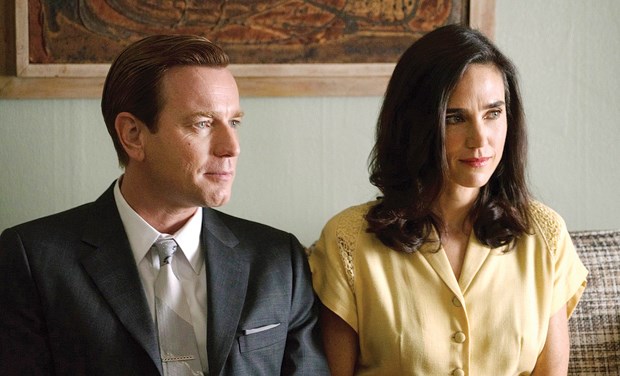American Pastoral. Directed by and starring Ewan McGregor. Co-starring Jennifer Connelly and Dakota Fanning. Rating: 6 (out of 10)
Ewan McGregor is clearly proud of his first directorial effort, American Pastoral, based on Philip Roth’s Pulitzer Prize-winning novel. Talking about his film during the press conference at the Toronto International Film Festival last month he seemed pleased but exhausted by the experience.
Asked whether he was keen to jump into the director’s chair again, McGregor protested the time away from his family and the dedication it takes to bring a film project to fruition: “You spend 16, 17 months of your life… carrying this precious thing.” Though he didn’t rule out directing again he wasn’t actively seeking it: “I hope the next story will find me”
McGregor plays the title role of Seymour “The Swede” Lavov, star high school athlete and a Jew who marries Dawn (Jennifer Connelly), former Miss New Jersey, the epitome of WASP-ishness. Swede takes over his father’s company in the city while cultivating a picture-perfect life in the country, complete with a little white house and dairy cows.
The pastoral idyll is shattered by the arrival of daughter Merry, who is not perfect. She stutters inexplicably. A small thing, in of itself, but a bad omen of things to come. The Swede adores his daughter, but Merry feels in direct competition with her beautiful mother when it comes to securing Daddy’s affections: “kiss me like you kiss mother.” (Well played by young Hannah Nordberg.)
Prosperous post-war America clashes violently with ‘60s rebellion as Merry (now Dakota Fanning) enters her teens. She spends an increasing amount of time with friends in the city, and occasionally doesn’t come home at all. Dawn tries to rein her in but Swede relents over and over again. Though he shouldn’t be, he’s surprised to learn that her room is filled with anti-war protest leaflets and propaganda.
How could this happen? They’re a progressive family, aren’t they? The glove factory Swede took over from his father employs mostly blacks, some of whom Swede considers friends as well as employees. (Uzo Aduba steals at least one scene. The Orange is the New Black actor says she signed on for the film because she was swayed by McGregor’s “energy and his voice.”) But the Vietnam war and self-immolation of a monk on live TV scream louder than Swede can: the damage to Merry’s fragile psyche is done.
So when the local post office is bombed, killing a neighbour, Merry goes missing and is the presumed culprit. Years pass with no word and then a sighting, and contact from a liaison, Rita (Valerie Curry). Rita uses the Swede’s conflicted relationship with his daughter to seduce him, stringing him along with the promise of information and the chance to see his little girl again.
McGregor can’t quite pull off the cockishness and larger-than-life zeal of a young Swede: he seems already beaten somewhat when we meet him, meaning that his fall into ignominy is less jarring than it should be.
Dawn is just as fragile as her daughter, taking an interesting path to recovery after a nervous breakdown, and Connelly gives a nuanced performance.
It’s Fanning who has the most difficult task: she becomes the main character in the film despite being tacitly unlikable, frustratingly oblique about her motivations and abandonment of such a seemingly perfect family.
Fans of Roth’s 1997 novel will lament the loss of the richness in the text, necessitated by the film’s two-hour running time. Absent are the themes of interfaith marriage and class aspirations, only briefly touched on in a scene where Swede’s father (Peter Riegert) objects, but is then won over by a convincing Dawn.
The film is bookended by narration by David Strathairn as Nathan Zuckerman, a writer attending his high school reunion and hearing the remarkable tale of what became of his hometown hero the Swede for the first time. The character of Nathan is key, as it illustrates the wider lament for the crumbling American dream, and a whole generation’s confusion about how it could’ve all gone so wrong.



